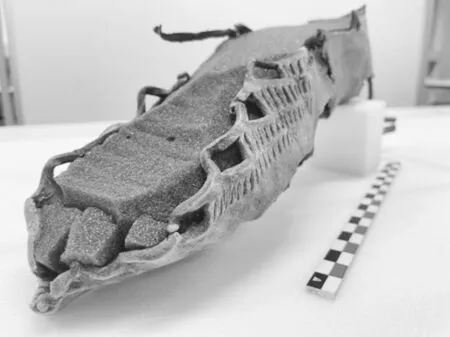千年“凉鞋”的时尚诉说
2022-11-29贵州罗跃梅
贵州 罗跃梅
近期,一只约有1,500年历史的“凉鞋”在挪威高山中被发现。通过对它的研究,我们可以一窥中世纪的时尚。

主题语境:考古 篇幅:368词 建议用时:7分钟
Sometime between 200 AD and 500 AD,someone crossing a high mountain pass in Norway discarded a shoe. More than 1,500 years later, an unusually warm summer melted centuries of accumulated snow and ice, revealing the ancient shoe. Archaeologists with the Secrets of the Ice project recovered the shoe in 2019.
The shoe isn't what you'd expect to find in a high mountain pass. It looks more like a sandal(凉鞋)than a hiking boot.Far to the south and east,in the Roman Empire,it would have been fashionable footwear; conservator (文物保护员) Vegard Vike at the Museum of Culture and History in Oslo, Norway, matched it to a type popular in Roman cities during 400 AD and 500 AD.“The similarity to footwear within the Roman Empire is striking,”Vike said.“It tells us that the people living in these geographically remote mountains had a connection to the continent.Roman imports have been found in South Norway previously,but the shoe tells us that ideas and fashion traveled as well.”

This particular piece of Roman fashion traveled to a mountain pass called Horse Ice Patch, 2,000 meters above sea level in the mountains of Western Norway—far beyond the boundaries of the Roman Empire even at its peak,but apparently not beyond Rome's influence.
Today, if you just look around Horse Ice Patch, it's almost impossible to spot the ancient and medieval(中世纪的)trails that once mixed together there. But a closer look reveals objects that still mark the routes people walked long ago.“The high mountain passes went out of use mainly because better roads were built in the lowlands from the mid-19th century,”said Lars Holger Pilø,Secrets of the Ice co-director.
Pilø and his colleagues at Secrets of the Ice have spent the last 15 years mapping the network of routes across and through the mountains. But many of those ancient and medieval trails are so long-neglected that it can be hard to see where they go.“You have this vast wilderness with no traces of humans, but then you realize it's actually brimming with clues,”said Pilø.“It gives the landscape an entirely new story and another context more than an item you find in the ice.”
Reading Check
1.What is surprising about the ancient shoe?
A.It was found in a high mountain pass.
B.It was made of an unusual material.
C.It remained in a perfect condition.
D.It was covered by snow and ice.
2.What did Vegard Vike imply in paragraph 2?
A.Hiking boots were popular in the Roman Empire.
B.Most ancient Romans lived in remote mountains.
C.Ancient Roman fashions influenced South Norway.
D.Ideas spread slowly within the Roman Empire.
3.What can we learn about Horse Ice Patch?
A.It was a busy road during the Roman Empire.
B.It used to be controlled by the Roman Empire.
C.It came into existence in the mid-19th century.
D.It is an object representing ancient Roman fashion.
4.What troubles Pilø and his colleagues in their work?
A.The dating of the ancient objects.
B.The mixed traces of humans.
C.The bad weather in the mountains.
D.The locations of the ancient trails.
Language Study
Ⅰ. Difficult sentence in the text
It tells us that the people living in these geographically remote mountains had a connection to the continent.它告诉我们,生活在地理位置偏远山区的人们同那一大陆是有联系的。
【点石成金】本句是一个主从复合句。that 引导宾语从句,在该从句中,living in these geographically remote mountains 是分词短语作后置定语。
Ⅱ. Text-centered chunks
match...to 把……同……配对
have a connection to 与……有联系
at one's peak 在鼎盛时期;处于高峰时期
go out of use 被废弃;不再被使用
